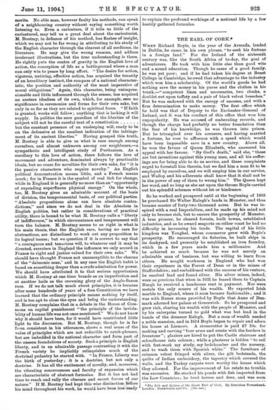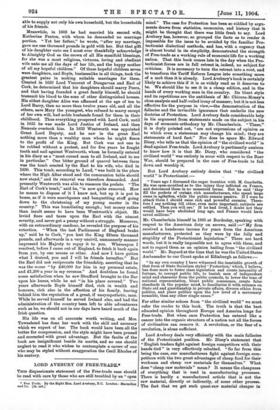century was, like the South Africa of to-day, the goal
of adventurers. He took with him little else than good wits
and a sound education. Though he came of a good family, he was yet poor; and if he had taken his degree at Benet College in Cambridge, he owed that advantage to the industry which won him a scholarship. Of the world's goods he had nothing save the money in his purse and the clothes in his trunk,—" competent linen and necessaries, two cloaks, a doublet cut upon taffety and a pair of black velvet breeches." But be was endowed with the energy of success, and with a firm determination to make money. The first office which he held was that of Deputy to the Excheator-General of Ireland, and it was his conduct of this office that won him unpopularity. He was accused of embezzling records, and though the charge had probably no better foundation than the fear of his knowledge, he was thrown into prison. But he triumphed over his accusers, and having married a fortune, he rose to affluence with a speed which would have been impossible save in a new country. Above all, he won the favour of Queen Elizabeth, who answered his appeal with her favour. "By God's death," said she, "these are but inventions against this young man, and all his suffer- ings are for being able to do us service, and these complaints urged to forestall him therein, but we find him a man fit to be employed by ourselves, and we will employ him in our service, and Wallop and his adherents shall know that it shall not be in the power of any of them to wrong him." The Queen kept her word, and so long as she sat upon the throne Boyle carried out his splendid schemes without let or hindrance.
So he worked and prospered until at the beginning of 1603 he purchased Sir Walter Ralegh's lands in Munster, and thus became master of forty-two thousand acres. But he was in- spired with a real Imperialism, and he made up his mind not only to become rich, but to ensure the prosperity of Munster. A true pioneer, he cleared forests, built towns, established industries, and as he owned seaports on either coast he had no difficulty in increasing his trade. The capital of his little kingdom was Youghal, whose commerce grew with Boyle's prosperity. He encouraged its fisheries, he built ships in its dockyard, and presently he established an iron foundry, which in a few years made him a millionaire. And he achieved so much because be was not merely an admirable man of business, but was willing to learn from others. He sought workmen in England who had won their experience in the Forest of Dean or in the mines of Staffordshire ; and emboldened with the success of his venture, he smelted lead and found silver. His silver mines, indeed, were so precious that when in 1631 he leased them to Captain Burgh he received a handsome rent in payment. Nor were metals the only source of his wealth. He exported Irish marble to England, where it soon became fashionable ; and it was with Ranse stone provided by Boyle that Anne of Den- mark adorned her palace at Greenwich. So he prospered and grew rich, sharing his wealth with the people of Munster, and by his enterprise turned to gold what was but lead in the bands of the dreamer Ralegh. But a man of wealth needed a noble mansion, and in 1614 Boyle began to repair and adorn his house at Lismore. A stonecutter is paid 27 10s. for making and carving "four arms and crests with the borders in freestone " ; glaziers are hired to put the Castle staircase and schoolhouse into colours ; while a plasterer is bidden "to coil with fret-work my study, my bedchamber and the nursery, and to wash them with Spanish white." The furniture of crimson velvet fringed with silver, the gilt bedsteads, the quilts of Indian embroidery, the tapestry which covered the walls, and the Turkey carpets were worthy the house which they adorned. For the improvement of his estate no trouble was excessive. He stocked his ponds with fish imported from the Low Countries ; he bred horses and deer, and was soon • The Life and Letters of the Great Earl of Cork. By Dorothea Townehend. London Duckworth and Co. [18s. net.]
Meanwhile, in 1603 he had married his second wife, Katherine Fenton, with whom he demanded no marriage portion. "Yet her father," be wrote, "after my marriage, gave me one thousand pounds in gold with her. But that gift of his daughter unto me I must ever thankfully acknowledge to Almighty God as the crown of all His manifold blessings, for she was a most religious, virtuous, loving and obedient wife unto me all the days of her life, and the happy mother of all my hopeful children." Of these hopeful children seven were daughters, and Boyle, businesslike in all things, took the greatest pains in making suitable marriages for them. Created in 1620 Lord Viscount of Dungarvan and Earl of Cork, he determined that his daughters should marry Peers, and that having founded a great family himself, he should transmit his blood to the sons of other distinguished houses. His eldest daughter Alice was affianced at the age of ten to Lord Barry, then no more than twelve years old, and all the others, save Mary the youngest, who refused to marry except of her own will, had noble husbands found for them in their childhood. Thus everything prospered with Lord Cork, until in 1625 he was made Lord Justice of Ireland, and then Nemesis overtook him. In 1633 Wentworth was appointed Great Lord Deputy, and he saw in the great Earl nothing more than a wealthy man whom he might fleece to the profit of the King. But Cork was not one to be robbed without a protest, and for five years he fought tooth and nail against Wentworth, whom he formally entered in his diary as a "most cursed man to all Ireland, and to me in particular." One bitter ground of quarrel between them was the tomb erected by the Earl to his wife, who died in 1630. This tomb, according to Laud, "was built in the place where the High Altar stood and the communion table should now stand," and its removal was therefore demanded. And presently Wentworth was able to reassure the prelate. "The Earl of Cork's tomb," said he, "is now quite removed. How he means to dispose of it I know not, but up it is put in boxes, as if it were marchpanes and banquetting stuff going down to the christening of my young master in the country." This was humiliating enough ; but money rather than insult seems to have been Wentworth's object. He levied fines and taxes upon the Earl with the utmost severity, and never got a penny without a struggle. Moreover, with an extraordinary candour, he revealed the purpose of his extortion. "When the last Parliament of England brake up," said he to Cork, "you lent the King fifteen thousand pounds, and afterwards in a very uncivil, unmannerly manner impressed his Majesty to repay it to you. Whereupon I resolved, before I came out of England, to fetch it back again from you, by one means or other. And now I have gotten what I desired, you and I will be friends hereafter." But the Earl did not reciprocate the friendship, asserting that he was the worse "by £40,000 for him in my personal estate, and £1,200 a year in my revenue." And doubtless he found some satisfaction when he saw Strafford brought to the Bar upon his knees, while he sat "in his place covered." Two years afterwards Boyle himself died, rich in wealth and honours, rich also in the affection of his family, leaving behind him the reputation of a great, if unsympathetic, man. While he served himself he served Ireland also, and had the administration of the country been left to able adventurers such as he, we should not in our days have heard much of the Irish question, His life was on all accounts worth writing, and Mrs. Townshend has done her work with the skill and accuracy which we expect of her. The book would have been all the better for compression, and the style might have been pruned and corrected with great advantage. But the faults of the book are insignificant beside its merits, and no one should neglect to read it who wishes to contemplate a career of one who may be styled without exaggeration the Cecil Rhodes of his century.
LORD AVEBURY ON FREE-TRADE,*











































 Previous page
Previous page